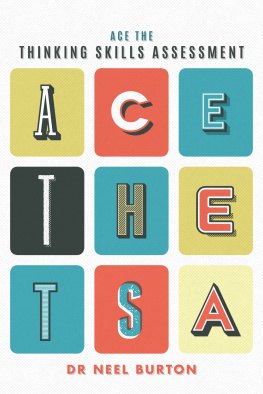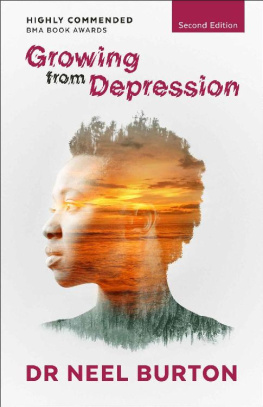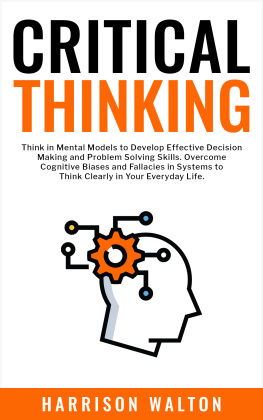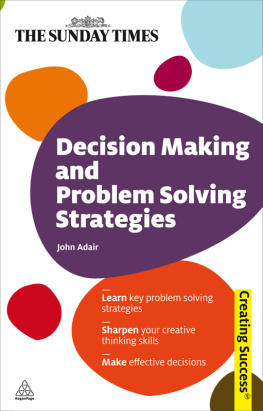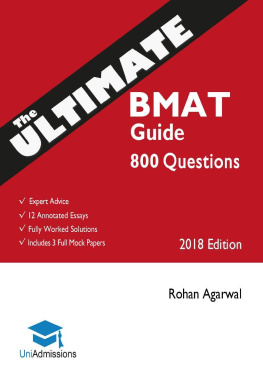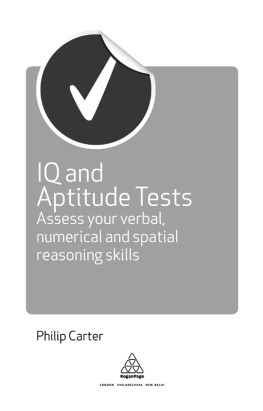Contents
ACE THE THINKING SKILLS ASSESSMENT
The foundation of every state is the education of its youth.
Diogenes of Sinope
ACE THE THINKING SKILLS ASSESSMENT
Dr Neel Burton
BSc, MBBS, MRCPsych, MA (Phil), AKC
Green Templeton College University of Oxford, Oxford, UK
A
Acheron Press
Flectere si nequeo superos Acheronta movebo
Acheron Press 2014
Published by Acheron Press
All rights reserved. No part of this book may be reproduced or transmitted, in any form or by any means, without permission.
A CIP catalogue record for this book is available from the British Library.
ISBN 978 0 9929127 1 0
Typeset by Phoenix Photosetting, Chatham, Kent, United Kingdom
Printed and bound by SRP Limited, Exeter, Devon, United Kingdom
About the Author
Dr Neel Burton is a psychiatrist, philosopher, writer, and wine-lover who lives and teaches in Oxford, England.
Apart from teaching psychiatry at Green Templeton College, Dr Burton teaches courses on entrance examinations such as the TSA, UKCAT, and BMAT, and tutors students on a one-to-one basis.
He is the recipient of the Society of Authors Richard Asher Prize, the British Medical Associations Young Authors Award, and the Medical Journalists Association Open Book Award.
Some of his other books include:
The Meaning of Madness
Hide and Seek: The Psychology of Self-Deception
The Art of Failure: The Anti Self-Help Guide
Plato: Letters to my Son
The Concise Guide to Wine and Blind Tasting
You can find Dr Burton at www.neelburton.com, as well as on Facebook and Twitter.
Chapter 1
Introduction to the TSA
The Thinking Skills Assessment (TSA) was designed, developed, and extensively researched by the Admissions Testing Service. It is used as an admission test for an increasing number of courses at an increasing number of universitiesespecially those courses, such as PPE (Philosophy, Politics, and Economics) at Oxford, for which thinking and problem-solving skills are critical.
In the TSA, the emphasis is on cognitive (or thinking) skills rather than knowledge as such, and the amount of knowledge required is minimal. The Admissions Testing Service website, which you ought to consult for the most up-to-date information, specifically states that students dont need any familiarity with specific texts or theoretical frameworkstheyre simply being tested on their ability to think through problems and arguments, critically and logically. This means that the best way to prepare for the TSA is to develop your thinking skills by working through a large number of TSA-style questions.
You should look at the TSA as an opportunity rather than a hurdle. Most obviously, it is an opportunity to stand out from your competition. From the point of view of academic institutions, the TSA offers an additional selection filter for courses that typically attract a large field of high-achieving applicants. As TSA scores closely correlate with future academic achievement, the TSA provides a valid and objective benchmark against which all applicants can be measured, regardless of background, nationality, gender, qualifications, and other such factors.
But the TSA also presents an opportunity to hone your thinking skills, which are going to be far more important than your actual course content to the impression that you are going to make on the world, to say nothing of your private happiness, which is perhaps the greater and yet more disregarded challenge. As the 20th century American psychologist BF Skinner (he of the rats) once said, Education is what survives when what has been learnt has been forgotten.
Who needs to sit the TSA?
At the time of writing, the TSA is being used by the University of Oxford for certain courses, the University of Cambridge for certain courses in certain colleges, University College London (UCL) for European Social and Political Studies (ESPS), and the University of Leiden in the Netherlands for its International Bachelor of Science in Psychology (IBP) programme.
At Oxford, the TSA is used for the following courses:
- Economics and Management
- Experimental Psychology
- Geography
- Philosophy and Linguistics
- Philosophy, Politics, and Economics (PPE)
- Psychology and Linguistics
- Psychology and Philosophy.
At Cambridge, a significant number of colleges use, or may use, the TSA for the following courses:
- Computer Science
- Economics
- Engineering
- Human, Social, and Political Sciences
- Land Economy
- Natural Sciences.
This information is apt to change, so remember to check the websites of the Admissions Testing Service and of the applicable universities and colleges.
What does the TSA involve?
The TSA is a pen-and-paper test with two sections. Section 1 consists of multiple-choice questions testing problem-solving skills, including numerical and spatial reasoning, and critical thinking skills, including understanding argument and reasoning using everyday language. Section 2 consists of a writing task.
Section 1 is 90 minutes long and comprises 50 multiple-choice questions.
Section 2 is 30 minutes long and you are asked to answer one essay question from a choice of four. The essay questions are not subject-specific.
TSA Oxford and TSA Leiden consist of both sections. TSA Cambridge and TSA UCL consist of Section 1 only.
A version of the TSA that contains only questions testing critical thinking is used for admission to Politics, Psychology & Sociology (PPS) by some colleges of the University of Cambridge.
Again, this information is apt to change, so do check the websites.
Practicalities
TSA Oxford and in general
You must sit the TSA Oxford in the same year that you are applying, regardless of whether you have sat it before or are deferring entry.
The TSA Oxford can be delivered either at your institution or through a global network of open test centres (see the Admissions Testing Service website). Most candidates sit the test at their own school or college. If in any doubt, speak to your Exams Officer or equivalent.
In 2014, test centres can register candidates for the TSA Oxford from 1 September to 17:00 BST on 15 October. You cannot register yourself for the test: your test centre needs to register you. Make sure to obtain from your test centre your candidate number, which serves as confirmation that you have been registered for the test. Some (but by no means all) test centres may charge you an administration fee to cover the costs of running the test.
In 2014, the TSA Oxford takes place on 5 November at 09:00 BST. The scheduled start times for centres outside the UK vary depending on where they are.
On test day, bring a soft pencil (HB or softer) and pencil eraser for Section 1, and a black ink pen for Section 2. For Section 1, enter your answers on the separate answer sheet. For each question, select one of A, B, C, D, or E. If you make a mistake, erase it thoroughly and try again.
Calculators and dictionaries (including bilingual dictionaries) are not allowed. Neither is correction fluid.
Access arrangements are available for candidates with certain conditions such as dyslexia; however, no extra time is allowed for candidates for whom English is not the first language.
TSA Cambridge
In 2014, the TSA Cambridge takes place during the Cambridge interview period. The college you are applying to registers you for the test, free of charge, and informs you of when and where it will take place. The test will take place either at the college itself or at a test centre in Cambridge.

